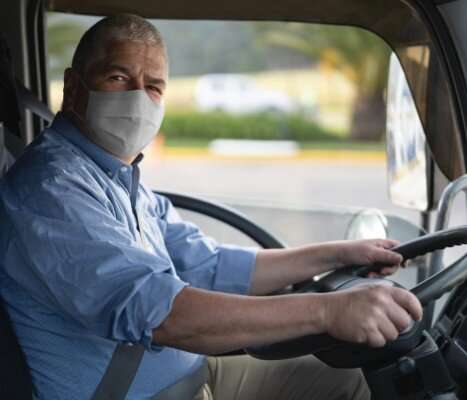
Each day, approximately 3 million loads are transported across the U.S. via semi trucks. The drivers of these vehicles help move 71 percent of the freight in our country including much needed commodities such as groceries, technology, medical equipment and much more.
Whether we realize it or not, these professionals play a large role in our daily lives. Perhaps now more than ever, we are relying on them as COVID-19 “stay at home” requests have increased the need for basic items such as groceries and toiletries. Additionally, these drivers play a key role in supporting COVID-19 testing sites and medical centers. But what happens when the pandemic begins to impact the $700 billion trucking industry?
It’s a question that many people might not think about, but it should be a valid concern for everyone, said Dr. Michael Lemke, Assistant Professor of Health and Behavioral Science at the University of Houston-Downtown.
Recently, Lemke has contributed a number of articles to journals exploring COVID-19 and the many health issues faced by commercial drivers as a possible (and probable) syndemic (or synergistic epidemic within a select population or community) within the trucking industry. Lemke has served as the principal investigator on recently published articles on this topic. These articles have appeared in the American Journal of Industrial Medicine; the Journal of Transport & Health; and the Journal of Occupational and Environmental Medicine. His collaborators on these papers were Dr. Yorghos Apostolopoulos, Dr. Lazaros K. Gallos (on JOEM only), and Dr. Sevil Sönmez.
According to Lemke, many commercial drivers face a number of health challenges, including obesity, cardiovascular disease and diabetes. Such conditions place them at high risk for contracting COVID-19. If they do become sick, the effects of the virus may be more severe and preexisting conditions can adversely affect their mortality rates. And given the long miles they travel and frequent stops (including COVID-19 hotspots), this population can potentially serve as cross-country carriers.
“If these drivers get sick, it affects everyone,” he said. “People will come into contact with these drivers at truck stops or their delivery stops. If they are very sick, their driving skills may be impaired And, when they return to their homes, they risk spreading the virus to family and friends.”
Lemke and collaborators also apply syndemic perspectives to try to understand how the COVID-19 pandemic fits into the numerous and ongoing health and safety issues in the trucking industry. In addition to the many health factors affecting them, truckers work long hours, have short breaks, face delivery deadlines, and are affected by ongoing policy changes. They also are tasked with navigating massive vehicles through major cities. As a result, truck drivers experience extreme stress on the road. This stress compounded with health challenges have placed additional mental and physical demands on drivers, which put them further at risk for COVID-19.
“COVID-19 fits into the bigger picture for drivers and the trucking industry,” Lemke said. “These articles address how this virus can be even more problematic for these drivers, who already face a number of stressors and obstacles.”
His hope is that these articles bring awareness to how the virus can compound the existing health challenges within the trucking industry, as well as its effect on drivers, consumers and the economy. Additionally, he hopes this research leads to impactful action strategies to support drivers.
“Right now, there aren’t solutions for these drivers when it comes to COVID-19,” he said. “We need to remember that they often have 10-hours breaks in which they must rest, eat, do laundry and other things most people take for granted. If they are sick, it’s difficult for them to access COVID-19 screenings or clinics for many reasons, including the fact that they cannot simply drive their vehicles to these sites. And, when it comes to quarantining, we must remember that these drivers may not receive sick pay from their respective employers and may be far from home if they are diagnosed with the virus on the road.”
Lemke’s knowledge of trucking comes from both research and firsthand experience. He is a former commercial driver and earned a Class A Commercial Driver’s License. He also served as an intern and later as a consultant for the American Trucking Associations, the largest trade organization dedicated to the trucking industry.
The facts presented in these articles, he said, can inform policy makers and industry leaders in ways that can ultimately create healthier and safer environments for commercial truck drivers.
Source: Read Full Article